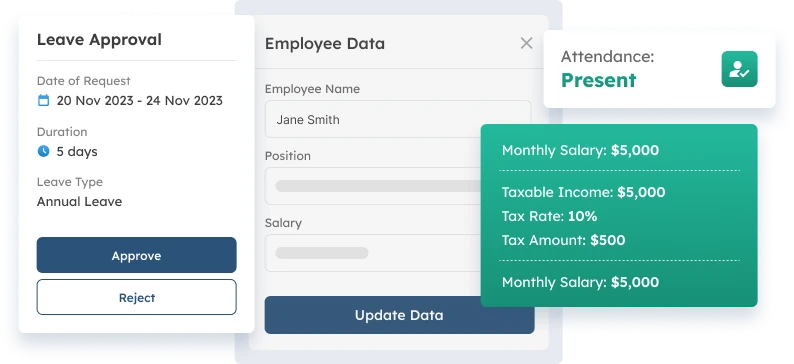In Singaporean businesses, compliance with human resources (HR) regulations is mandatory and key to building a strong corporate reputation. With constantly evolving employment regulations, companies must be able to adapt quickly to avoid potentially detrimental legal risks.
If HR resources fail to manage compliance and regulations effectively, companies face numerous risks, ranging from large fines and lawsuits to the revocation of operating licenses, ultimately damaging the company’s reputation.
According to MOM, beginning April 1, 2016, all companies in Singapore must retain detailed employment records for employees covered by the Employment Act. Therefore, companies must understand HR compliance, regulations, and applicable laws to optimize them efficiently.
In this article, we will explain what HR compliance is, its importance to businesses, the issues that must be addressed in HR compliance, and how to manage it. Learn more here.
- HR compliance is the practice of ensuring that human resources policy, procedure, and practices in Singapore companies align with relevant labor laws, regulations, and ethical standards.
- The importance of HR compliance is, avoid legal penalties, protect the company’s reputation, build employee trust, manage risk, employee act, Workplace Safety and Health Act (WSHA), and the Central Provident Fund (CPF) Act
- Areas of HR compliance are employment laws, workplace safety, data protection and privacy, equity and inclusion, employment contracts, wages, and salaries
- ScaleOcean’s HRIS software streamlines HR compliance by automating key processes like personnel records, payroll, and benefits management, ensuring real-time data accuracy and legal adherence.

What Is HR Compliance?
HR compliance is the practice of ensuring that human resources policy, procedure, and practices in Singapore companies align with relevant labor laws, regulations, and ethical standards.
This includes managing areas such as employment contracts, wages, working hours, health and safety, data privacy, and anti-discrimination laws. Keeping current with evolving regulations and establishing effective governance systems are essential for preventing legal problems, penalties, and reputational harm.
Importance of HR Compliance
HR compliance is essential for organizations to ensure they meet legal standards, protect their reputation, and foster a positive work environment. By adhering to labor laws and regulations, companies safeguard their operations and maintain a healthy, productive workforce. Here are key reasons why HR compliance is critical.
1. Avoids Legal Penalties
HR compliance ensures that companies adhere to labor laws, corporate tax regulations in Singapore, and workplace safety standards, reducing the risk of costly legal penalties. Non-compliance can lead to fines, lawsuits, and even loss of business licenses.
By staying compliant, businesses protect themselves from financial and reputational damage, avoiding costly legal disputes.
2. Protects the Company’s Reputation
A company’s reputation is heavily influenced by its adherence to HR compliance. Ensuring that employment practices are transparent and legally sound helps maintain trust with both employees and customers.
Companies with a strong compliance record demonstrate integrity, which can attract top talent and loyal customers while preventing negative publicity.
3. Builds Employee Trust
When a company follows HR compliance guidelines, employees feel secure and valued. This fosters a sense of trust, as workers are assured that they are treated fairly and legally.
Compliance with labor laws, equal opportunity regulations, and workplace safety rules enhances employee satisfaction, retention, and overall morale, creating a positive work culture.
4. Manages Risk
HR compliance is a key component in managing business risks. By staying compliant with regulations, businesses minimize the likelihood of workplace disputes, claims, and litigation.
Effective compliance management allows businesses to anticipate changes in the law, implement necessary adjustments, and avoid potential disruptions to operations. This proactive approach mitigates legal, financial, and operational risks.
5. Employment Act
This employee law sets out the basic terms and conditions of employment, including working hours, overtime, and leave entitlements.
Through HR compliance, companies can ensure that employees are treated fairly, with their rights protected in areas like pay, rest days, and termination. It also shields employers from legal disputes and penalties by ensuring that their employment practices align with national labor laws.
6. Workplace Safety and Health Act (WSHA)
The Workplace Safety and Health Act (WSHA) requires employers to ensure a safe and healthy working environment for their employees. This includes implementing risk management systems, providing safety training, and addressing workplace hazards.
Compliance with WSHA helps prevent workplace accidents, boosts employee morale, and minimizes potential liabilities, fostering a productive and secure work environment.
7. Central Provident Fund (CPF) Act
The Central Provident Fund (CPF) Act mandates that employers contribute to employees’ retirement savings, medical, and housing needs. Ensuring HR compliance and employee laws in Singapore with CPF regulations is essential for businesses to avoid penalties and demonstrate their commitment to employees’ long-term financial security.
Timely and accurate CPF contributions enhance employee trust and ensure businesses meet their statutory obligations.
Key Areas of HR Compliance in Singapore
HR compliance covers several critical areas that ensure businesses operate within legal and ethical boundaries. Focusing on key compliance aspects like employment laws, workplace safety, data protection, and equity & inclusion helps organizations minimize risks and maintain a positive, lawful work environment.
Here are the key areas to focus on, including:
1. Employment Laws
Employment laws are fundamental in HR compliance, governing aspects such as wages, working hours, employee benefits, and termination procedures. These laws ensure fair treatment of employees and protect against discrimination and exploitation.
Adhering to local, state, and federal regulations helps businesses avoid costly legal disputes and ensures a fair and legally compliant workplace.
2. Workplace Safety
Workplace safety compliance is critical for protecting employees from accidents and health hazards. Compliance in this area minimizes workplace injuries, promotes employee well-being, and reduces liability for the company.
HR regulations, such as OSHA (Occupational Safety and Health Administration) guidelines, require businesses to implement safety measures, conduct regular inspections, and provide necessary training.
3. Data Protection and Privacy
Data protection and privacy of HR regulation and laws, such as GDPR and HIPAA, govern how businesses collect, store, and use employee data.
HR departments must ensure that sensitive information, including personal details and health data, is kept secure and only used for legal, specific purposes. Compliance with data protection laws helps businesses avoid hefty fines, protect employee trust, and prevent data breaches.
4. Equity and Inclusion
Equity and inclusion are vital elements of HR compliance, ensuring that all employees, regardless of their background, have equal access to opportunities and a fair working environment.
This includes adhering to anti-discrimination laws, promoting diversity, and fostering an inclusive workplace culture. Compliance with these principles leads to better employee engagement, higher retention rates, and a stronger reputation as an employer of choice.
5. Employment Contracts
Businesses must furnish clear and comprehensive employment agreements to their workers. These contracts must detail crucial particulars like job duties, salary framework, advantages, and other vital employment terms.
A well-defined agreement aids in ensuring that both the employer and employee recognize their obligations and expectations. Effective human resource management plays a crucial role in ensuring these contracts align with both company policies and legal standards.
2. Wages and Salaries
Human resources departments have to guarantee that workers are compensated justly and aligned with Singapore’s wage rules. This involves following guidelines for minimum pay, overtime compensation, and salary disbursements.
Conformance to these regulations aids in avoiding wage disagreements and confirms that staff get paid quickly and accurately for their labor, cultivating confidence between employees and employers through the human resource planning process.
Guide on HR Compliance
Singapore’s HR compliance, such as employment laws, oversees diverse aspects of the employment connection, encompassing everything from recruitment processes to dismissal protocols. These laws are crafted to safeguard the entitlements of both employees and employers, assuring impartiality and openness in the work setting.
HR departments have to keep current with these regulations to prevent legal problems and ensure their practices stay in line. To stay compliant, HR must become familiar with key legislation, such as the Employment Act.
This act establishes fundamental employment conditions, including working hours, overtime compensation, and rest days. Additionally, organizations should align their employee assessments with a KPI key performance indicator, ensuring they fulfill their legal duties while advancing a fair and just working environment for all staff.
Are the Companies Responsible for HR Compliance with Local Laws?
Indeed, the HR department has a key role in making certain a company adheres to HR regulations. They are accountable for staying abreast of the newest laws and ensuring company policies match these needs. By remaining current, HR can efficiently direct the organization in fulfilling legal obligations.
Furthermore, HR is assigned with training employees on their rights and duties, including during the onboarding process, promoting a compliant workplace culture. Adherence to laws and regulations is crucial to evade legal issues and protect the organization’s reputation. HR’s proactive method helps lessen risks and ensures long-term success for the company.
HR Compliance and Law Topics Every Company in Singapore Should Know
In my role as an HR professional, grasping the legal framework is vital for adherence to both local and global employment legislation. Remaining informed about HR rules helps forestall legal troubles and promotes a workplace founded on fairness and respect.
Understanding current HR trends is essential for keeping policies up-to-date and ensuring compliance with evolving laws and regulations. Here are a few key legal and HR compliance law topics that every company should be familiar with:
1. Workplace Discrimination Laws
Singapore’s laws forbid prejudice in hiring, promotions, or dismissals based on race, gender, religion, or disability. HR must ensure equitable recruitment and equal career prospects for all employees. An unbiased, inclusive workplace is essential for compliance and staff satisfaction.
2. Wage and Hour Laws
Human Resources needs to adhere to rules regarding working hours, overtime, and wage disbursements, guaranteeing equitable payment for staff, including overtime. Accurate monitoring of work hours and adherence to minimum wage laws are vital to sidestep legal issues and uphold compliance.
Additionally, providing employees with a clear payslip template ensures transparency in wage calculations and helps prevent payment disputes.
3. Employee Benefits Laws
Human resources strategy needs to administer employee benefits such as vacation time, sick days, and maternity leave, in keeping with legal obligations. Correctly tracking allowances and guaranteeing employees obtain their benefits promptly is crucial for sustaining compliance and offering just compensation.
A Human Resource Management System (HRMS) can help streamline this process, ensuring that all benefits are managed efficiently.
4. Immigration Laws
Companies have to abide by immigration laws when employing foreign workers, guaranteeing they possess valid work permits. HR is accountable for handling paperwork, keeping in conformity with immigration regulations, and supporting foreign employees in fulfilling legal employment stipulations.
What are the Most Common HR Compliance Issues?
HR compliance is vital to upholding a legally sound work environment. Nonetheless, there are numerous common problems that HR departments often encounter relating to compliance. These difficulties can lead to substantial legal and financial repercussions.
Let’s examine some of the most prevalent HR compliance issues that companies should be cognizant of:
1. Discriminatory Hiring Practices
Discrimination based on gender, ethnicity, religion, or other personal characteristics is prohibited in the hiring process. HR must guarantee that their recruitment methods are neutral, with clear, objective criteria for selection. Failure to address discrimination can result in lawsuits and harm the company’s reputation.
2. Wrongful Dismissals
A wrongful dismissal happens when an employee is fired without a valid reason or due process. HR must verify that all terminations adhere to legal requirements and suitable procedures. This assures compliance with employment regulations and protects both the employee’s rights and the organization from legal ramifications.
3. Maternity Discrimination
Maternity discrimination occurs when pregnant employees are treated unfairly or refused certain advantages, such as maternity leave. HR must follow rules that safeguard pregnant employees’ rights and ensure they receive the appropriate benefits. Failure to do so can result in legal implications and a drop in company morale.
4. Salaries Owed to Employees
Ensuring that employees receive their fair wages is an important HR responsibility. HR must accurately monitor wages and ensure prompt payment in accordance with contracts and labor rules. Delays or inaccuracies in salary payments might lead to legal action and the loss of employee trust.
How to Ensure HR Compliance
Ensuring HR compliance is essential for maintaining a lawful and ethical workplace. By establishing clear policies, conducting audits, staying updated on legal changes, investing in employee training, leveraging technology, and addressing complaints efficiently, businesses can effectively manage compliance risks and uphold their legal obligations.
1. Create Clear Policies
Clear and comprehensive HR policies help set expectations and guidelines for both employees and management. These policies should cover essential areas like workplace conduct, anti-discrimination, benefits, and safety protocols.
Having documented policies ensures consistency in decision-making, aligns with legal requirements, and provides a reference point in case of disputes, reducing the risk of non-compliance.
2. Conduct Regular Audits
Regular compliance, regulation, and law of human resource audits are vital for identifying any gaps or areas where the company may not be fully compliant with labor laws and regulations.
Auditing HR processes, such as payroll, employee records, and safety procedures, helps pinpoint potential issues before they lead to penalties or legal disputes. This proactive approach ensures that the company stays on track with all regulatory requirements.
3. Stay Informed
Laws and regulations around HR compliance frequently change, so businesses need to stay informed about the latest legal updates. Subscribing to newsletters, attending webinars, and consulting with legal experts can help HR teams keep up with evolving standards.
Staying informed ensures that the company can quickly adapt to any legal changes and avoid penalties for non-compliance.
4. Invest in Training
Employee training is crucial for maintaining HR compliance. Regular training sessions should be provided for HR personnel, managers, and employees to educate them about workplace policies, rights, and responsibilities.
Training also ensures that the workforce understands critical compliance issues like harassment, diversity, and health and safety regulations, reducing the likelihood of violations.
5. Use Technology
Leveraging HR technology can streamline compliance management and reduce human error. Tools such as automated payroll systems, compliance tracking software, and electronic document management systems help businesses stay organized and ensure that all compliance tasks are completed on time.
Implementing technology to manage HR compliance can also help companies track changes in regulations and implement necessary adjustments quickly and accurately.
6. Handle Complaints Promptly
Addressing complaints swiftly and efficiently is key to maintaining compliance and a positive work environment. Complaints related to discrimination, harassment, or workplace safety should be investigated immediately, with clear processes for resolution.
Promptly handling complaints demonstrates the company’s commitment to compliance and employee well-being, preventing issues from escalating into larger legal problems.
Keep up with HR Compliance with HRIS Software ScaleOcean
ScaleOcean HRIS software enables firms in Singapore to optimize HR processes while adhering to local requirements. It streamlines personnel records, payroll, benefits, and compliance management.
ScaleOcean lowers errors and manual effort by automating operations, ensuring that organizations adhere to employment rules and maintain an efficient, compliant workplace. To assist organizations in getting started, ScaleOcean provides a free demo that allows you to test the software’s capabilities firsthand.
Additionally, organizations that use ScaleOcean may be eligible for the CTC (Cost-to-Company) grant, which gives financial assistance for integrating HR and accounting technology. ScaleOcean’s HRIS also has several essential characteristics, which are listed below:
- Regulatory Compliance Automation: Ensure compliance with local labor laws, minimizing risk of non-compliance.
- Error-Free Payroll: Automates payroll to reduce manual errors and ensure accurate, timely payments.
- Centralized Data Management: Stores all employee information in one platform for easy access and compliance reporting.
- Real-Time Compliance Tracking: Continuously monitors and updates processes to stay aligned with changing regulations.
- Employee Self-Service Portal: Allows employees to access personal data, pay slips, and leave records, enhancing transparency and reducing admin work.
Conclusion
HR compliance is critical for organizations to maintain a fair and legally sound environment. Businesses can minimize legal risks and build a healthy work environment by comprehending important requirements such as anti-discrimination statutes, employee perks, and regular salary payments.
Ensuring compliance through good HR processes is beneficial to long-term business success. ScaleOcean provides bespoke solutions to firms wishing to simplify HR compliance, including our HRIS software, which automates and streamlines HR operations.
This comprehensive application enables firms to efficiently handle personnel information, payroll, benefits, and other aspects while being fully compliant with local legislation. ScaleOcean’s HRIS solution is suitable for businesses looking to stay compliant while increasing operational efficiency.
FAQ:
1. What are the three most important HR laws?
The three key HR laws in Singapore are the Employment Act, which sets out basic employment conditions, the Workplace Safety and Health Act for maintaining a safe environment, and the CPF Act, which requires employers to contribute to employees’ retirement savings.
2. What are the HR policies?
HR policies are rules and guidelines that organizations implement to manage their workforce. These policies cover areas like recruitment, leave, performance management, and workplace safety. They ensure fairness and consistency in handling employee matters and maintaining legal compliance.
3. What is section 14 of the Employment Act in Singapore?
Section 14 of Singapore’s Employment Act regulates working hours, overtime pay, and rest days for employees. It ensures that employees’ work schedules are fair, setting limits on working hours and guaranteeing compensation for overtime in accordance with the law.
4. What’s the difference between HR and compliance?
HR deals with managing the workforce, including hiring, benefits, and employee relations. Compliance, on the other hand, ensures that the company follows legal and regulatory standards. While HR focuses on people management, compliance ensures the company adheres to relevant laws and regulations.












 PTE LTD..png)
.png)

.png)








.png)
.png)
















